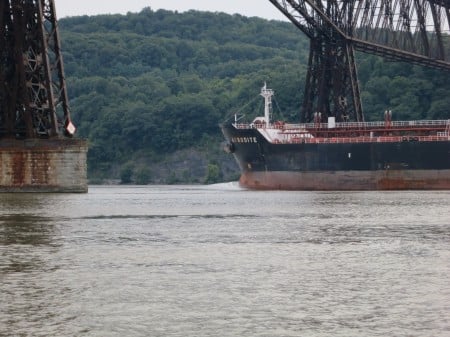Crude Oil Transportation Risks, Local and Global

- When:
- September 22, 2014: 6:30PM to 8:30PM
- Where:
- Marist College, Fusco Recital Hall (Located at the Student Center. Please park at McCann Center), 3399 North Rd (Route 9), Poughkeepsie, NY map
Riverkeeper and Scenic Hudson will present on the risks of crude oil transportation in the Hudson River Valley at Marist College on Monday, Sept. 22, at 6:30 p.m.
The Marist College School of Science is hosting the event, and it is co-sponsored by the Mid-Hudson Rowing Association.
Before 2011, there was little or no crude oil being transported through the Hudson Valley. In 2013, 1.6 billion gallons of Bakken crude oil was transferred from train to barge in Albany for transport down the Hudson River. The transfer of up to 2.8 billion gallons of crude oil at the Port of Albany is permitted annually. Additionally, up to 30 trains per week—each carrying millions of gallons or more—are traveling through the Hudson Valley along the railroad tracks on the west side of the Hudson.
Transportation of crude oil in the Hudson Valley has begun without to any comprehensive study of environmental impacts. The industry could expand to include heavy crude oil, such as Canadian tar sands, if proposed oil terminal projects in Albany and New Windsor are permitted.
Both types of oil—Bakken and heavy crudes—pose significant and distinct risks. Bakken crude oil is highly volatile, and has been involved in several catastrophic accidents, most notably the destruction of downtown Lac-Megantic, Quebec, and the loss of 47 lives following a train derailment in July 2013. A barge collision in the Mississippi River in February 2014 spilled 31,500 gallons of Bakken crude oil, resulting in 65 miles of river being closed. Just 95 gallons was recovered, according to the National Oceanographic and Atmospheric Administration. A train derailment in Lynchburg, Virginia, resulted in a Bakken crude oil spill into the James River in April 2014, setting the river on fire, and temporarily closing drinking water supplies.
A spill of heavy crude oil could be even worse, because heavy crude sinks. Any recovery of spilled heavy crude oil requires clear and gentle water, and even then a successful response can only be expected to recover 5% of spilled oil. The spill response experts we have consulted have suggested that recovery of heavy crude oil in the Hudson, with its strong currents, tides and turbidity, would be impossible. A spill would likely require the shutdown of drinking water intakes in the vicinity. A pipeline spill of more than 800,000 gallons of heavy crude affected 35 miles of the Kalamazoo River in Michigan, and hasn’t been fully remediated four years later, despite a cleanup effort that could cost more than $1 billion.
More than 100,000 people living in and around Poughkeepsie, Highland, Hyde Park, Rhinebeck and Port Ewen draw drinking water from the Hudson River. Every state-designated significant wildlife habitat in the Hudson River estuary is at risk.
Several Marist College classes will attend.
Community members attending this event should park at the McCann Center, and plan to carpool.

